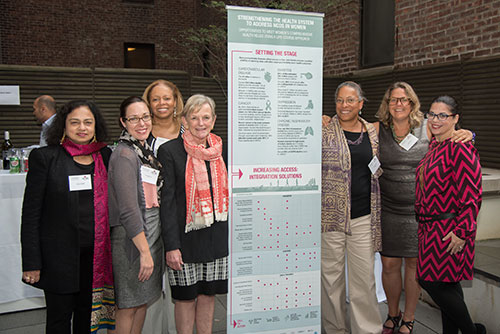By Nalini Saligram, Founder and CEO of Arogya World
What a week this has been.
The end of the Millenium Development Goals (MDGs), the new Sustainable Development Goals (SDGs), the Pope’s visit to the United States, United Nations meetings, a host of side events, and the Clinton Global Initiative. A heady mixture for a global health enthusiast!
This week the world took stock of the progress made in the last 15 years and wrapped the Millennium Development Goals, which taught us—among other things—how important measurement is to creating change. On September 25, the United Nations adopted the SDGs, which aim to end poverty, protect the planet, and ensure prosperity for all. This ambitious set of 17 goals and 169 targets addresses the unfinished business of the MDGs, and also adds on a transformative stand-alone women’s goal and bold new targets including for non-communicable diseases (NCDs). It was a moment in history and generated a sense of optimism and hope in New York.
Many interesting side events took place in New York to mark the introduction of the SDGs. At one led by the Taskforce on Women & NCDs, of which Arogya World is a member, leaders discussed why NCDs matter as we consider the role of women in the SDGs. The stature of the speakers and the points they made firmly established a link between women and NCDs and elevated the discussion to the political level. Arogya World was pleased to be one of the event sponsors.

Arogya World CEO Nalini Saligram (left) with other sponsors of the UN side event organized by the Taskforce for Women & NCDs and the American Heart Association.
At another event, Novartis revealed a clever and innovative access program, which provides 15 NCD medicines at an affordable $1 per treatment per month in Kenya, Ethiopia, and Vietnam. I am a die-hard believer in the power of prevention, but this program for the first time gave me hope that treatment access may be viable even for NCDs.
At the first full day of the Clinton Global Initiative Annual meeting this past Sunday, I was on a panel called “Emerging Markets: Balancing Growth with Equity and Sustainability.” I brought NCDs into the discussion, since you cannot consider equity and sustainability without considering the effects of NCDs globally—in the workplace, in the home, and in our respective communities.
This week I also attended the U.S. India Business Council’s gala dinner in Washington, D.C. as a guest of Cigna. It was important to hear from Indian and U.S. officials (including Vice President Joe Biden) who expressed great optimism for the future of Indian-U.S. relations.
All in all, an extraordinary week for us in global health.

